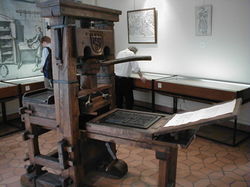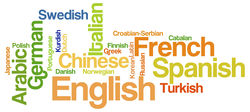Difference between revisions of "Category:Women's Studies--1450s"
(→1450s) |
|||
| (One intermediate revision by the same user not shown) | |||
| Line 61: | Line 61: | ||
== History of research ([[1450s]] -- Notes == | == History of research ([[1450s]]) -- Notes == | ||
In 1473 the ''editio princeps'' of Boccaccio's "De mulieribus claris" | ==== Medieval legacy ==== | ||
Giovanni Boccaccio's ''De mulieribus claris'' (1374) was the first collection devoted exclusively to biographies of women in Western literature. Among the 106 biographies, only 4 have some interest for “Biblical Studies”: Eve, Athaliah, Mariamne and Poppea. | |||
Inspired by Boccaccio, [[Geoffrey Chaucer]] wrote in the 1380s his poem, ''The Legend of Good Women'', which included only a brief reference to [[Esther]]. | |||
Christine de Pisan's ''Le livre de la cité des dames'' is the first "feminist" treatise of the Renaissance, and the first written by a woman. It mentions several "biblical" women, from both the Old and the New Testament, including Mary Magdalene, the Queen of Sheba, Deborah, Elizabeth, Mary of Nazareth, Esther, Judith, Susanna, Sarah, Rebecca, Ruth, Mariamne, and others. | |||
==== 1450s ==== | |||
In 1473 the ''editio princeps'' of Boccaccio's "De mulieribus claris" was published. The work directly inspired Lucretia Tornabuoni's "Sacred Poems". Three of them deal with women ([[Susanna]], [[Esther]], [[Judith]]). | |||
Latest revision as of 19:17, 19 December 2019
|
|
Women's Studies : 2020s -- 2010s -- 2000s -- 1990s -- 1980s -- 1970s -- 1960s -- 1950s -- 1940s -- 1930s -- 1920s -- 1910s -- 1900s -- 1850s -- 1800s -- 1700s -- 1600s -- 1500s -- 1450s -- Home Timeline : 2020s -- 2010s -- 2000s -- 1990s -- 1980s -- 1970s -- 1960s -- 1950s -- 1940s -- 1930s -- 1920s -- 1910s -- 1900s -- 1850s -- 1800s -- 1700s -- 1600s -- 1500s -- 1450s -- Medieval -- Home
|
History of research (1450s) -- Notes
Medieval legacy
Giovanni Boccaccio's De mulieribus claris (1374) was the first collection devoted exclusively to biographies of women in Western literature. Among the 106 biographies, only 4 have some interest for “Biblical Studies”: Eve, Athaliah, Mariamne and Poppea.
Inspired by Boccaccio, Geoffrey Chaucer wrote in the 1380s his poem, The Legend of Good Women, which included only a brief reference to Esther.
Christine de Pisan's Le livre de la cité des dames is the first "feminist" treatise of the Renaissance, and the first written by a woman. It mentions several "biblical" women, from both the Old and the New Testament, including Mary Magdalene, the Queen of Sheba, Deborah, Elizabeth, Mary of Nazareth, Esther, Judith, Susanna, Sarah, Rebecca, Ruth, Mariamne, and others.
1450s
In 1473 the editio princeps of Boccaccio's "De mulieribus claris" was published. The work directly inspired Lucretia Tornabuoni's "Sacred Poems". Three of them deal with women (Susanna, Esther, Judith).
Pages in category "Women's Studies--1450s"
The following 2 pages are in this category, out of 2 total.


